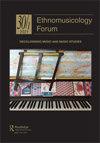鼠标还是音乐?运用分析探究音乐注意力的转移
IF 0.5
1区 艺术学
0 MUSIC
引用次数: 0
摘要
本文认为,民族音乐学已经趋向于远离分析音乐声音,因此,没有区分两种不同但互补的注意模式,即与鼠声相关的多模态认知和与音乐相关的更多的“远音乐”(音乐导向)注意。基于(1)对古希腊和中国音乐的研究,(2)对多模态感知的研究,(3)对婴儿远音感知的发现,以及(4)三个当代案例研究,本文得出结论,鼠声和音乐可能最好被理解为音乐参与连续体的端点。Mousike需要关注竞争模式之间的协同互动,如语言、音乐、视觉和动觉,而音乐则涉及更多的“技术化”,以“扩展”音乐认知(扩展思维论文),需要专注地转向音乐声音。建立在婴儿发展阶段的基础上,成人对老鼠和音乐的关注过程必须通过分析来确定,然而,这既可能带来挑战,也可能带来优势。挑战是民族音乐学训练中以音乐为导向的强调可能出现的偏见,这可能会阻碍我们在表演中关注其他竞争模式的能力;其优势在于,只有通过聆听音乐才能获得启示性的洞见。本文章由计算机程序翻译,如有差异,请以英文原文为准。
Mousike or music? Using analysis to explore shifts in musical attention
ABSTRACT This paper argues that ethnomusicology has trended away from analysing music sound and, consequently, has not distinguished between two distinct-yet-complementary modes of attention, namely the multimodal cognition associated with mousike and the more ‘teleomusical’ (music-directed) attention associated with music. Building on (1) research on music in ancient Greece and China, (2) studies on multimodal perception, (3) the discovery of teleomusical perception in infants, and (4) three contemporary case studies, this paper concludes that mousike and music may be best understood as endpoints on a continuum of musical engagement. Mousike requires attending to the synergistic interaction among competing modalities, such as the linguistic, musical, visual, and kinesthetic, whereas music involves a greater amount of ‘technologizing’ in ‘extending’ musical cognition (extended mind thesis), requiring an attentive shift towards music sound. Founded on stages in infant development, the adult processes of attending to mousike and music must be ascertained through analysis, which can, nevertheless, present both challenges and advantages. The challenges are the biases that can emerge from the music-directed emphasis of ethnomusicological training, which may impede our ability to attend to other competing modalities in performance; the advantages are the revelatory insights that can only come from attending to music sound.
求助全文
通过发布文献求助,成功后即可免费获取论文全文。
去求助
来源期刊

Ethnomusicology Forum
MUSIC-
CiteScore
1.10
自引率
25.00%
发文量
29
期刊介绍:
Articles often emphasise first-hand, sustained engagement with people as music makers, taking the form of ethnographic writing following one or more periods of fieldwork. Typically, ethnographies aim for a broad assessment of the processes and contexts through and within which music is imagined, discussed and made. Ethnography may be synthesised with a variety of analytical, historical and other methodologies, often entering into dialogue with other disciplinary areas such as music psychology, music education, historical musicology, performance studies, critical theory, dance, folklore and linguistics. The field is therefore characterised by its breadth in theory and method, its interdisciplinary nature and its global perspective.
 求助内容:
求助内容: 应助结果提醒方式:
应助结果提醒方式:


